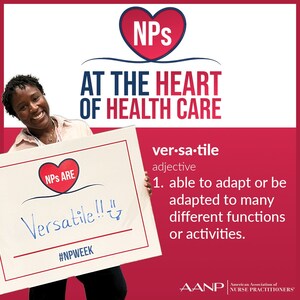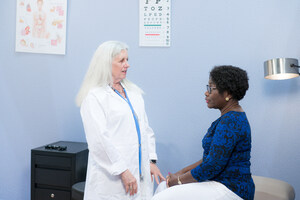AUSTIN, Texas, Dec. 12, 2024 /PRNewswire/ -- As the nurse practitioner (NP) profession looks ahead to 2025, the American Association of Nurse Practitioners® (AANP) has identified five key health trends that will impact the health care system in the coming years.
"As health care trends evolve, the demand for America's 385,000 licensed nurse practitioners remains high due to their exceptional, patient-centered approach to care," said AANP President Stephen A. Ferrara, DNP. "Patients nationwide deserve access to high-quality health care, and NPs are experts in various fields, including primary care, elder care, mental health care, substance use disorder treatment and artificial intelligence (AI) innovations. Nurse practitioners are dedicated to providing evidence-based care as the health care landscape continues to change."
The Top Five Health Care Trends of 2025
1. AI Technologies Can Improve Patient Care – Nurse practitioners are leading the way to improve health care access and outcomes for millions of patients and leveraging the potential of new technologies, including AI, to benefit their patients. In their constant pursuit of excellence in health care, NPs are exploring the capability of AI to analyze vast amounts of patient data from remote monitoring devices to allow more proactive interventions and added patient engagement in care.
The potential for AI to automate non-clinical routine tasks, like note-taking and documentation, will allow NPs and other providers to focus even more on patient interactions. Used properly, AI can make a real difference while reducing documentation and administrative burdens. Nurse Practitioners are well-positioned to evaluate and guide the implementation of safe and effective AI technologies and must be actively involved throughout the entire AI development and integration process to improve patient outcomes.
2. Growing Demand for Elder Care – As the U.S. population ages, the rising demand for elder care requires a growing health care workforce. Every Baby Boomer will be at least 65 by 2030, with the oldest members closer to 85 – meaning 1 out of every 5 Americans will be eligible to enroll in Medicare.
At the same time, the NP profession is 385,000 strong, ensuring needed access to care for patients. NPs provide care to seniors in a wide variety of settings, including telehealth and in-home care.
3. Mental Health Integration into Primary Care – NPs and other primary care providers are increasingly integrating patients' mental health into primary care screenings for both physical and mental health problems, during their visits. Mental health conditions have increased sharply since the COVID-19 pandemic, and more than 122 million people live in areas where access to treatment is limited due to provider shortages.
With a strong focus on whole-patient care, NPs understand the important role mental health plays in the overall well-being of their patients. In addition, increasing numbers of psychiatric mental health nurse practitioners will play a vital role in meeting the nation's need for diagnosing, treating and managing mental health conditions.
4. Limited Access to Primary Care Services– More than a quarter of Americans reported they are not up to date on health screenings and immunizations, according to AANP's State of Primary Care in America national survey. The survey also found that nearly one-third of adults, particularly those who are younger, Hispanic or living in rural areas, reported difficulty accessing health care services. Among adults who did see a provider for primary care, nearly a third (31%) turned to telehealth or to convenient care clinics.
This survey echoes AANP's 2023 survey, which found that more than 25% of respondents had waited more than two months for an appointment with a health care provider. Adopting Full Practice Authority policies removes barriers to care so patients can choose an NP to access preventive screenings and health services, which are essential to improving the health of the nation.
5. NPs Treating Patients with Substance Use Disorders – According to the National Institute on Drugs and Addiction's 2024 fact sheet, more than 40 million people in the United States had a substance use disorder (SUD), and only 6.5 percent received treatment. More than 100,000 people died from an overdose in 2021. NPs who specialize in SUD and opioid use disorder (OUD) treatment are experts in this addiction crisis, prescribing medications to aid in recovery and ensuring that their patients have access to counseling, behavioral therapy, peer support and other interventions.
The American Association of Nurse Practitioners® (AANP) is the largest professional membership organization for nurse practitioners (NPs) of all specialties. It represents the interests of the more than 385,000 licensed NPs in the U.S. AANP provides legislative leadership at the local, state and national levels, advancing health policy; promoting excellence in practice, education and research; and establishing standards that best serve NPs' patients and other health care consumers. As The Voice of the Nurse Practitioner®, AANP represents the interests of NPs as providers of high-quality, cost-effective, comprehensive, patient-centered health care. To locate an NP in your community, visit npfinder.com. For more information about NPs, visit aanp.org.
SOURCE American Association of Nurse Practitioners (AANP)

WANT YOUR COMPANY'S NEWS FEATURED ON PRNEWSWIRE.COM?
Newsrooms &
Influencers
Digital Media
Outlets
Journalists
Opted In






Share this article